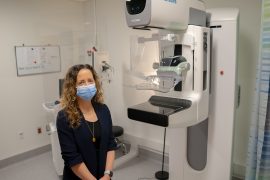April 25, 2024
There is an urgent need to “bring back the village” post-pandemic to support teens and foster a sense of community belonging for young people, says a Simon Fraser University researcher.
A new study led by Hasina Samji, a professor in the Faculty of Health Sciences, explored the role of modifiable community- and societal-level factors in youth mental health and well-being.
The study drew from Samji’s 2022 Youth Development Instrument survey of more than 8,800 Grade 11 students in B.C. schools. Data was collected from January to March 2022 during the fifth wave of the pandemic, a time that included the highest number of daily COVID-19 case counts.
Students were asked to note their number of positive and adverse experiences (up to age 18), the degree to which they experienced depression and anxiety symptoms, and to rank their mental wellbeing and life satisfaction.
According to Samji, having more positive childhood experiences was associated with lower levels of depression and anxiety, and better life satisfaction and mental health. Conversely, people with a higher number of adverse childhood experiences had more symptoms of depression and anxiety, and poorer life satisfaction and mental health.
Adults with four or more adverse childhood experiences are four times more likely to experience depression and low life satisfaction, three times more likely to experience anxiety and are 30 times more likely at attempt suicide than people with no adverse childhood experiences.
“We can’t prevent adversity for all young people,” says Samji. “We know adversity leads to so many poor outcomes across a whole host of domains, whether it’s infectious diseases, or substance use, or obesity, or cardiac disease. When you look at people who have been exposed to four or more adverse childhood experiences, versus fewer or zero adverse experiences – they are at higher risk for almost every poor health outcome.”
Importantly, positive childhood experiences were associated with better mental health and well-being even for youth who experienced adverse childhood experiences. Positive childhood experiences include being supported by friends, feeling that their family stands by them during difficult times, feeling a sense of belonging to their community and being safe and protected by an adult in their home.
Adverse childhood experiences include verbal, physical and sexual abuse, emotional and physical neglect, domestic violence, caregiver mental illness, incarceration, substance use and divorce. Additional adverse experiences are also found at the societal-level (food-insecurity, homelessness); at the community-level (feeling unsafe at school or in the community); and at the family-level (caregiver separation or divorce).
“As a health-care system, we’re often very reactive,” Samji says. “Young people tell us that we wait for them to be in crisis before we provide the supports that they need. I really wanted to go upstream and think about what kind of individual level supports, but also structural and systemic supports can we provide earlier.”
Mental illness, Samji explains, is not randomly distributed in the populations, but follows a socio-economic gradient. The study therefore recommends systemic changes to provide extra supports to families, by institutions, (justice, health, schools), to increase positive childhood experiences and reduce adverse experiences.
“We have to change the paradigm,” Samji says. “When people think about mental health, they only think of mental illness, but mental health is so much more.
“Just like physical health, there is the illness aspect, but we know we can do more to support our physical health: We can work out, we can eat well. Similarly for mental health. Mental illness is not a done deal. You can delay it; you can prevent it in certain cases. There is, of course a genetic component, just like there is in physical illness.”
This study, and other research into the social and structural determinants of mental well-being, highlight the importance of promoting well-being by addressing social determinants of mental health – alongside supporting those with mental health challenges.
Samji’s Youth Development Instrument survey has grown to 32 school districts in 2024, more than half of the districts in B.C., from six school districts in 2021.






